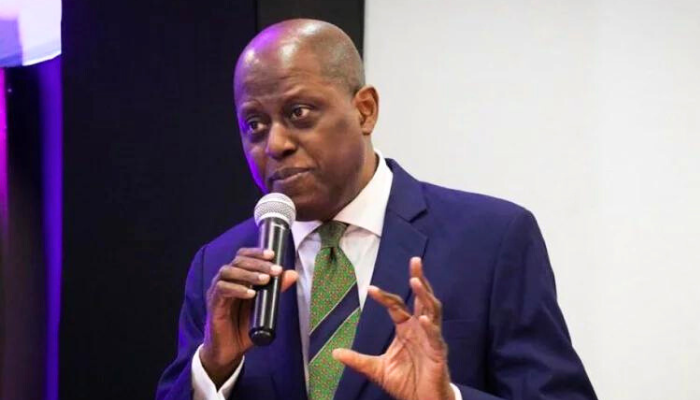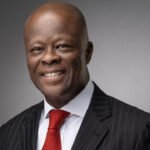The governor of the Central Bank of Nigeria (CBN), Olayemi Michael Cardoso, has said the apex bank under his watch will immediately roll out short term measures to address the country’s foreign exchange crisis.
Cardoso and four deputy CBN governors were yesterday confirmed by the Senate after two hours of grilling during plenary.
Those confirmed alongside Cardoso are Mrs Emem Nnana Usoro, Mr. Muhammad Abdullahi Dattijo, Mr Philip Ikeazor and Dr Bala M. Bello.
The value of naira continues to slide as a dollar now exchanges for about N1, 000 at the parallel market despite the unification of all segments of the foreign exchange markets in June.
Mobile Forex Trading: How Technology Is Shaping the Nigerian Trading Landscape
3 sachet water workers remanded for stealing truck
Speaking before their confirmation, Cardoso said the foreign exchange crisis was worrisome, and that there must be a stable exchange rate for the country to achieve economic prosperity.
In addressing the forex crisis, Cardoso said the new management of the apex bank will immediately look at short term measures, which he said were operational and system related.
He said the CBN would come up with rules that are open and transparent and that any of the players in that business would understand.
Cardoso said, “On the issue of foreign exchange, which everybody has been talking about, (it) is very worrisome. We need to have an exchange rate that is very stable to have a country that we all dream of.
“There are two very important issues that we will have to address if we are confirmed. It is what I will term operational and system related issues.
“We are aware that there are unsettled obligations by the CBN. Whether it is $4bn, $5bn or $7bn, I don’t know but definitely the immediate priority is to ascertain the extent.
“We need to find a way to take care of that. It will be naive for us to be expecting to succeed if we are not able to handle that side of the foreign exchange market.
“Secondly, we have to come up with rules that are transparent, that any of the players in that business understands.
“We cannot reasonably expect that serious foreign investors, portfolio investors, who generally have an impact on your market, will do so if you do not have an open, transparent system that everybody understands and can rely on.
“In setting up those guidelines, one will also have to carry stakeholders along. We should be ready to engage people, get stakeholders together and share views and promptly come up with strategies.
“The two things, which appear simple, are far more important than they appear.
“These two measures, which are the immediate steps that we will take, will go a long way to ease off the situation we are having right now in terms of wanting investors to come in.
“Those that want to do business in Nigeria, they want to see this is clear, and if they don’t, they will hold on to their money.
“These are the short term measures. Once we get in, it is what we will address. I know that the impact will engender greater liquidity coming into the market. Those seeming withholding confidence will come back here. They will see that the coast is clear.”
On the issue of inflation and costs of goods, Cardoso said that the new management would adopt evidence-based monetary policies.
“There is the need to significantly revamp the infrastructure in the central bank with respect to data and to ensure that our data gathering capacity is significantly enhanced so that we can make decisions based on proper data. This is a key in measuring inflation,” he said.
He further said reliable studies have shown that in the past 10 to 15 years, at least 50 per cent of inflation has been as a result of money supply and deficit financing.
“This is a big problem and it’s something we have to face frontally.”
He pledged that the CBN would work in collaboration with the fiscal authorities to address deficit financing.
Cardoso also said the economic policy proposal of the administration identified a set of physical reforms and growth patterns that is targeted to achieve $1trn GDP within 8 years.
He said the apex bank had, for the past few years, deviated from its core mandates and not complied with the CBN Act.
“We have seen the effect of not doing things rightly. The new management of CBN will have zero tolerance for non-compliance to guidelines,” he said.
In his remarks, Senate President Godswill Akpabio urged the Senate Committees on Banking, Insurance and other Financial Institutions to carry out a thorough oversight of the apex bank to ensure that things are done properly.
Experts urge low interest rate environment
Commenting on what the CBN governor said, Professor of capital market, Uche Uwaleke said: ‘I congratulate Dr Yemi Cardoso on his confirmation as CBN governor. I am happy to note that, in addition to his primary mandate of maintaining monetary and price stability, he recognizes the need to work closely with the government to stimulate economic growth. This would require, in the first instance, a halt in the present policy tightening stance of the bank and having in place deliberate measures to engender a low interest rate environment that will facilitate access to capital for SMEs.
“On the vexed issue of forex management, his plan to clear backlog of forex would be a step in the right direction as it would go a long way in restoring confidence of investors in the Nigerian economy.
“I equally expect him to pay close attention to the supervision of deposit money banks in particular as well as ensure compliance of corporate governance code by regulated financial institutions.”
Financial Analyst Kalu Aja said: “The minister of finance and the CBN governor know every banker and broker of consequence in Nigeria.
“That should count for something. The banks need to aggressively meet customer needs for dollar to reduce the need to hold it for ‘just in case.”
Also speaking on the matter, Senator Shehu Sani said: “Much expectation from the new CBN Governor Cardoso; to rescue our national currency, reset the monetary policy and depoliticise the institution. Avoid political rice farmers, fake pyramids, forex sponges and banking parasites.”
The senator representing Ondo South, Jimoh Ibrahim charged the new governor of the CBN to harness the opportunities of borrowing to improve Nigeria’s economy.
Ibrahim, who made the remarks during the screening of the CBN governor on the floor of the National Assembly on Tuesday, said the fact that Nigeria’s debt-to-GDP ratio stands at about 30 per cent gives the country opportunities to borrow more.
He said: “I don’t know what kind of economic policy you are going to advise our president. Also, why are you afraid of loans? Because the GDP-to-debt ratio is about 27–30 per cent. This means you have the opportunity to borrow as much as 70 per cent of your GDP.
“Dubai has a population of 12 million people, and they owe $167 billion. They borrowed this money, developed the economy, and are paying it back without difficulty. Is this not the right time to think outside the box?” he asked.

 Join Daily Trust WhatsApp Community For Quick Access To News and Happenings Around You.
Join Daily Trust WhatsApp Community For Quick Access To News and Happenings Around You.

